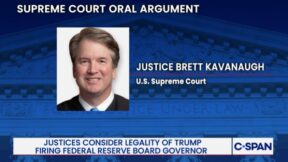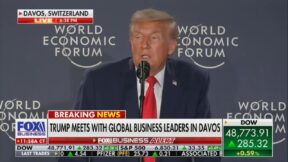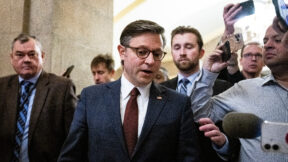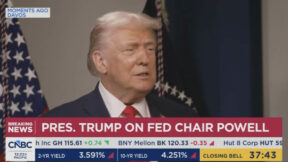Jen Psaki Smacks Down Chris Wallace Grilling on MSNBC Deal: ‘Highest Ethics Standards Of Any White House In History’
CNN+ host Chris Wallace asked White House Press Secretary Jen Psaki to defend her criticism of Florida’s so-called “Don’t Say Gay” law, suggesting it addresses legitimate parental concerns.
Mr. Wallace conducted a thorough and at times very friendly interview with Ms. Psaki on the latest episode of the CNN+ series Who’s Talking to Chris Wallace, but chose a few different hills upon which to plant a flag.
One such subject was the chin-stroking, pearl-clutching but vaguely-defined “ethics” concerns raised by critics of Psaki’s reported handshake deal with MSNBC.
Wallace asked her about the “controversy” three times, and twice asked her to specifically respond to former White House ethics chief Walter Shaub’s criticisms — many of which can be found in a 46-tweet Twitter thread. Psaki acknowledged the legitimacy of the concerns, then swatted them away:
WALLACE: You know, it has caused some controversy. I want to discuss it briefly with you. What is the latest on your discussions with MSNBC to become an anchor and analyst over there?
PSAKI: I have nothing to announce about what’s next. I’m going to sleep at some point when I leave, I’m going to maybe read some fiction books. I’m going to spend time with my family. What I will tell you, Chris, and you know this from covering White Houses in the past, there are certain requirements of anybody who’s serving, if you are talking to or engaging, thinking about any future employment, which is normal, that’s what nearly everybody does, who at some point will leave the White House. I have gone over and above those requirements. I’ve received full counseling from the counsel’s office, and I will continue to do that throughout my time here at the White House.
WALLACE: A number of independent experts, including the former ethics chief in the Obama White House, Walter Shaub, however, have raised questions about the propriety of someone representing the president, representing the country, sitting behind the podium, standing behind the podium at the White House at the same time that they’re negotiating a deal with a media outlet. Your response?
PSAKI: Well, again, I think what’s most important for people to know is that I have gone over and above any ethics requirement for any White House, and we have the highest ethics standards of any White House in history, including for anyone engaging in any discussions about future employment, which, by the way, everybody does who works in any White House, because you have to figure out what life looks like next. But beyond that, Chris, I hope people judge me by how I engage with people in the briefing room. I call on everybody, I engage with everybody. I take tough questions from a broad range of outlets and reporters and journalists. And I hope, most days are, or nearly every day, I treat people equitably and with complete fairness. And I hope that’s how I am judged.
WALLACE: One last question in this regard. Walter Shaub, the former ethics chief in the Obama White House, says, “Well, at the least, be more transparent.” For instance, are there some things that you have recused yourself from doing now, because of the fact that you’re in this kind of limbo, that you used to do before?
PSAKI: Well, certainly I can tell you that for anyone I’ve engaged or I’m engaged in any discussions with, I haven’t appeared on their networks.
WALLACE: But in terms of your job in the White House, is there are certain decisions that you can’t make, or don’t make, that you used to make?
PSAKI: There are no legal ethical requirements on that front, Chris, but I do go over and above, and like anyone, I would recuse myself from any conversation that would present any remote conflict of interest.
Psaki has been asked about this issue a lot of late, but these are probably her most detailed responses to date. Here are some points to note:
Psaki was cagey about her departure, as has been her modus operandi of late, but appeared to want to stress that there will be a decent interval of time between her exit from the White House and her arrival at MSNBC. The lack of such an interval has been one ill-defined basis for criticism.
She repeatedly stressed that this is normal — that every White House staffer must navigate ethics rules when moving to an outside position.
Specific examples — like not appearing on the network in question and promising to recuse “from any conversation that would present any remote conflict of interest” — were given.
To that point, Psaki tacitly acknowledged a deal — or at least discussion of a deal — with a network other than CNN or Fox News, each of whom she has granted interviews recently.
Now, there’s absolutely nothing wrong with people asking questions like Shaub’s — there wouldn’t be ethics requirements like these in the first place if the premise wasn’t legit — but the sheer volume and vague spectrality of the criticisms that have exploded forth since the news hit have been staggering.
For example, folks had an easy time saying the move didn’t look good, made things “awkward” at NBC News, and is “wrong,” but weren’t really able to explain how or why.
One of the first to jump all over Psaki was NBC’s Kristen Welker, who twisted the knife hard when she asked Psaki “how can you continue to be an effective briefer if you do, in fact, have plans to join a media outlet?”
Psaki repeated her earlier assurance, and Welker went in again, asking “How is it ethical to have these conversations with media outlets while you continue to have a job standing behind that podium?”
This was obviously done for show, for Welker to prove that the news wouldn’t keep her from asking questions that appear “tough,” but which don’t actually have any merit. As Psaki’s answers to Wallace illustrate, there’s nothing inherently unethical about any of it, provided the guidelines are followed. If Psaki began calling on Welker more frequently or displayed some other form of favoritism, that would be a reason for concern. No one is suggesting she has.
In fact, no one has quite been able to articulate what ethical rule Psaki is supposed to have run afoul of.
There was a collective media outrage-gasm when Psaki accurately dragged Fox News on a podcast, and Fox News got mad at her for being mean to Peter Doocy, and people clucked their tongues and said this was very wrong since she’s about to go work at Fox’s competitor.
But again, people seem to be missing the huge difference between an “ethical problem” and “a thing I don’t like that just seems wrong, WRONG to me.”
Psaki made her comment — which she has repeatedly clarified was directed at Fox News and not Peter Doocy — during a podcast, not at the White House. And she made nearly identical remarks — if less funny ones — in an interview with Mediaite that long predated her alleged talks with MSNBC. She has done so in countless settings. It would be absurd to suggest that this time, she was motivated by a desire to gain a competitive edge for her future employer, and inaccurate to suggest her jab was some sort of ethical violation.
Come to think of it, speaking of ethics ad changing jobs, why hasn’t anyone noticed or cared that Chris Wallace — longtime Fox News host-turned-CNN personality — didn’t ask Psaki a single question about the network or his former breakroom buddy Peter Doocy? The flap was the top media story last week, and Psaki’s interplay with Fox News is a defining characteristic of the briefings. He asked about other outlets and reporters.
But I’m sure Wallace’s answer would be very similar to Psaki’s — he’s fulfilling all legal and ethical requirements. And for whatever reason, that’s enough for Wallace, but not for Jen Psaki.
Watch above via CNN+.
This is an opinion piece. The views expressed in this article are those of just the author.
New: The Mediaite One-Sheet Newsletter
Your daily summary and analysis of what the many, many media newsletters are saying and reporting. Subscribe now!






Comments
↓ Scroll down for comments ↓